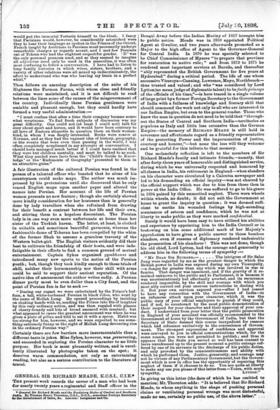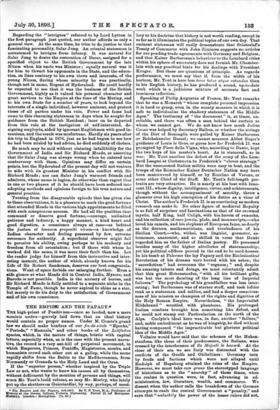GENERAL SIR RICHARD MEADE, K.C.S.L, C.I.E.* THE present work records
the career of a man who had been for nearly twenty years a regimental and Staff officer in the
• General Sir Richard Heade and the Feudatory States of Central and Southern India. By Thomas Henry Thornton, 0.8.1., D.O.L., sometime Foreign Secretary to the Government of India, ko, London: Longmana and Co.
Bengal Army before the Indian Mutiny of 1857 brought him
to public notice. Meade was in 1859 appointed Political Agent at Gwalior, and two years afterwards promoted as a Major to the high office of Agent to the Governor-General for Central India. In 1870 he was specially selected to
be Chief Commissioner of Mysore "to prepare that province for restoration to native rule ; " and from 1873 to 1875 he rendered most important services at Baroda, and thereafter "ably represented the British Government for five years at Hyderabad" during a critical period. The life of one whom successive Viceroys—Canning, Lawrence, Mayo, Northbrook— thus trusted and valued ; and who "was considered by Lord
Lytton (no mean judge of diplomatic talent) to be facile princeps of the officials of his tinae,"—is here traced in a single volume
of large print by a former Foreign Secretary to the Government of India with a fullness of knowledge and literary skill that should commend the work not only to all who are interested in our Indian Empire, but even to the general reader. Those who knew the man in question do not need to be told that "through- out the States of Central and Southern India—territories as populous as Italy and little less extensive than the German Empire—the memory of RICHARD MEADE is still held in reverence and affectionate regard as a friendly representative of the protecting Power and the impersonation of justice, courtesy and honour,"—but none the less will they welcome
and be grateful for this tribute to that memory.
One melancholy reflection is left to the members of Sir Richard Meade's family and intimate friends,—namely, that after forty-three years of honourable and distinguished service, during which he was universally respected and honoured by all classes in India, his retirement in England—when slanders on his character were circulated by a Calcutta newspaper and led to his demanding an official inquiry—was not cheered by the official support which was due to him from those then in power at the India Office. He was suffered to go to his grave in 1894 pained by this unmerited neglect. There were wheels within wheels, no doubt; it did not suit the Government at home to grant the inquiry in question ; it was deemed suffi- cient to soothe his wounded feelings by high-sounding
assurances of esteem and confidence, which he was not at liberty to make public as they were marked confidential. Surely it would have been easy to have utilised his abilities
and experience by appointing him to the India Council or in bestowing on him some additional mark of her Majesty's approbation to have given a public answer to those baseless slanders, even if reasons of diplomacy rendered undesirable the prosecution of his slanderer ! This was not done, though his old chief, Lord Lytton, had the courage and generosity to address him in the following terms of sympathy :—
" My DEAR SIR RICHARD,— The intrigues of Sir Salar Jung were regarded by me as the greatest danger to which the British power in India was exposed during my own Viceroyalty, —a danger far greater than any which was involved in war or famine. That danger was imminent, and if the gravity of it re• mained unknown to the public and to Parliament, it is because it was unostentatiously but effectually averted, and its recurrence rendered impossible, by the skill and courage with which you most ably carried out your onerous instructions in dealing with it. But your own services exposed you—after I had ceased to have any connection with the Government of India—to an infamous attack upon your character, which it was the public duty of your official employers to punish if they could, and if not, to counteract by the most public demonstration of their respect for your character and their approval of your con- duct. I understand from your letter that the public prosecution in England of your assailant was officially recommended to the Government at home by the Government of India, but that the Secretary of State deemed this coarse inexpedient for reasons which had reference exclusively to the convenience of Govern- ment. The strongest expressions of confidence and approval were conveyed to you in official communications which, for the same reason, you were not permitted to publish ; and thus it appears that the State you served so well has been content to leave unredressed up to the present moment a.public outrage suf- fered by one of its servants in the discharge of his public duties, and only provoked by the conscientiousness and ability with which he performed them. Justice, generosity, and courage may not be virtues of any Parliamentary Government, but the Govern- ment which is now in office has the opportunity of repairing this neglect of them if it chooses to do so. You are quite at liberty to make any use you please of this letter from—Yours, with much sympathy, LYTTON."
In giving us this letter (the date of which he has omitted to mention) Mr. Thornton adds: "It is believed that Sir Richard Meade, to whom anything in the shape of pushing personal claims or ventilating personal wrongs was most distasteful, made no use, certainly no public use, of the above letter."
Regarding the "intrigues" referred to by Lord Lytton in the first paragraph just quoted, our author affords us only a general view. At the same time, he tries to do justice to that fascinating personality, Salar Jung. An oriental statesman is accustomed to intrigue from infancy. It was natural for Salar Jung to desire the restoration of Berar, assigned for a specified object to the British Government by the late Nizam when his uncle was Minister ; equally natural was it for him to thwart his opponents in the State, and the educa- tion, on lines contrary to his own views and interests, of the young Nizam, during whose minority he was practically, though not in name, Regent of Hyderabad. He could hardly be expected to see that it was the business of the British Government, highly as it valued his personal character and great services to the Empire at the time of the Mutiny, and to his own State for a number of years, to look beyond the interests of a single individual, however eminent, and protect those of all parties under his role. Power and fame had come to this charming statesman in days when he sought for guidance from the British Resident ; later on he departed from this rule at the instigation of self-interested, de- signing employes, aided by ignorant Englishmen with good in- tentions, and the result was misfortune. Hardly six years after his trip to England in 1876, just as he had began to see how he had been misled by bad advice, he died suddenly of cholera.
So much may be said without claiming infallibility for the Government of India and Sir Richard Meade, or asserting that Sir Salar Jung was always wrong when he entered into controversy with them. Opinions may differ on certain points, but the Hyderabad of the present day will not venture to side with its greatest Minister in his conflict with Sir Richard Meade; nor can Salar Jung's warmest friends and admirers, whose name is legion, do otherwise than regret that in one or two phases of it he should have been seduced into adopting methods and opinions foreign to his true nature and .general practice.
Turning from the disagreeable episode that has given rise to these observations, it is a pleasure to mark the good fortune that attended Meade in the various high appointments he filled with such conspicuous success. He had all the qualities that command or deserve good fortune,—courage, unlimited patience and industry, a happy manner, a kind heart and good digestion, a conscience always at ease—as befitted the justum et tenacem propositi virum—a knowledge of Indian character and feeling possessed by few, extreme reverence for authority. A superficial observer might fail to perceive his ability, owing perhaps to his modesty and freedom from all ostentation; but if those with whom he worked did the same, it was more their fault than his. Let the reader judge for himself from this instructive and inter- eating memoir, the author of which, already known for his Life of Sir Robert Sandeman, deserves our best congratula- tions. Want of space forbids our enlarging further. Even a side glance at what Meade did in Central India, Mysore, and Baroda is not possible. India is the nursery of heroes, and Sir Richard Meade is fully entitled to a separate niche in the Temple of Fame, though he never aspired to shine as a star, but merely to do his duty to the satisfaction of Government and of his own conscience.



































 Previous page
Previous page